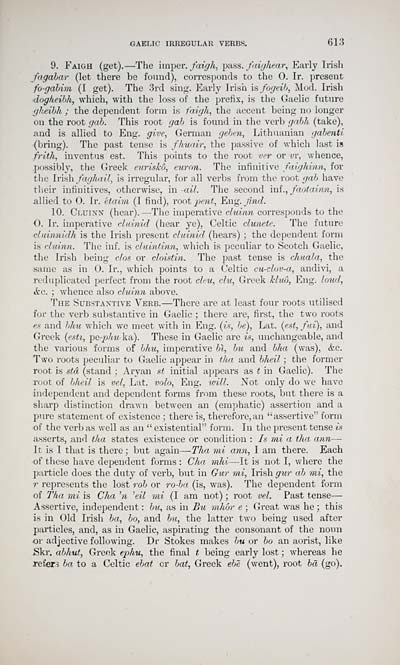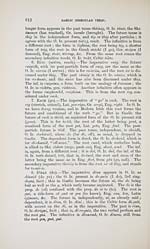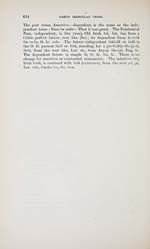Download files
Complete book:
Individual page:
Thumbnail gallery: Grid view | List view

GAELIC IRREGULAU VERBS, 61-3
9. Faigh (get). — The imper. faigh, pass, faiyhear. Early Irish
Jagabar (let there be found), corresponds to the 0. Ir. present
fo-gabim (I get). The 3rd sing. Early Irish isfogeih, Mod. Irish
doglieihh, which, with the loss of the prefix, is the Gaelic future
gheibh ; the dependent form is faigli, the accent being no longer
on the root gah. This root gah is found in the verb gohh (take),
and is allied to Eng. give, German geben, Lithuanian gabenti
(bring). The past tense is flmair, the passive of which last is
frith, inventus est. This points to the root ver or vv, whence,
possibly, the Greek eririshu, eurnn. The infinitive faighinn, for
tlie Irish />(r/A(T-i7, is irregular, for all verbs from the root gab have
tlieir infinitives, otherwise, m. -ail. The second h\i., faotaiiin, in
allied to 0. Ir. etaim (I find), root^ji??i^, 'Kn^. find.
10. Cluixx (hear). — The imperative duinn corresponds to the
O. Ir. imperative duinid (hear ye), Celtic dunetc. The future
duinnidh is the Irish present duinid (hears) ; the dependent form
is duinn. The inf. is didnfAnn, which is peculiar to Scotch Gaelic,
the Irish being c/os or doistin. The past tense is diuala, the
same as in 0. Ir., which points to a Celtic cu-dov-a, andivi, a
reduplicated perfect fx'om the root dru, chc, Gi'cek Hico, Eng. lotid,
Ac. ; whence also duinn above.
The Substantive Verb. — There are at least four roots utilised
for the verb substantive in Gaelic ; there are, first, the two roots
e<; and bhu which we meet with in Eng. (is, be), Lat. {est, fai), and
Greek (esti, pe-/)/mka). These in Gaelic are is, unchangeable, and
the various forms of bhu, imperative bl, bu and bha (was), &c.
Two roots peculiar to Gaelic appear in tka and bheil ; the former
root is sta (stand ; Aryan st initial appears as t in Gaelic). The
root of bheil is vd, Lat. volo, Eng. vnll. Not only do we have
independent and dependent forms from these roots, but there is a
sharp distinction drawn between an (emphatic) assertion and a
pure statement of existence ; there is, therefore, an "assertive" form
of the verb as well as an " existential" form. In the present tense is
asserts, and tha states existence or condition : Is mi a tha ann —
It is I that is there ; but again — Tha mi ann, I am there. Each
of these have dependent forms : Cha mhi — It is not I, where the
particle does the duty of verb, but in Gur mi, Irish gur ab mi, the
r represents the lost I'ob or ro-ba (is, was). The dependent form
of Tha mi is Cha '?i 'eil mi (I am not) ; root vel. Past tense —
Assertive, independent : Im, as in Bu mhor e ; Great was he ; this
is in Old Irish ba, bo, and bu, the latter two being used after
particles, and, as in Gaelic, aspirating the consonant of the noini
or adjective following. Dr Stokes makes bu or bo an aorist, like
Skr. abhut, Grefik e2)hu, the final t being early lost ; whereas he
xefer-j ba to a Celtic ebat or bat, Greek ebe (went), root bd (go).
9. Faigh (get). — The imper. faigh, pass, faiyhear. Early Irish
Jagabar (let there be found), corresponds to the 0. Ir. present
fo-gabim (I get). The 3rd sing. Early Irish isfogeih, Mod. Irish
doglieihh, which, with the loss of the prefix, is the Gaelic future
gheibh ; the dependent form is faigli, the accent being no longer
on the root gah. This root gah is found in the verb gohh (take),
and is allied to Eng. give, German geben, Lithuanian gabenti
(bring). The past tense is flmair, the passive of which last is
frith, inventus est. This points to the root ver or vv, whence,
possibly, the Greek eririshu, eurnn. The infinitive faighinn, for
tlie Irish />(r/A(T-i7, is irregular, for all verbs from the root gab have
tlieir infinitives, otherwise, m. -ail. The second h\i., faotaiiin, in
allied to 0. Ir. etaim (I find), root^ji??i^, 'Kn^. find.
10. Cluixx (hear). — The imperative duinn corresponds to the
O. Ir. imperative duinid (hear ye), Celtic dunetc. The future
duinnidh is the Irish present duinid (hears) ; the dependent form
is duinn. The inf. is didnfAnn, which is peculiar to Scotch Gaelic,
the Irish being c/os or doistin. The past tense is diuala, the
same as in 0. Ir., which points to a Celtic cu-dov-a, andivi, a
reduplicated perfect fx'om the root dru, chc, Gi'cek Hico, Eng. lotid,
Ac. ; whence also duinn above.
The Substantive Verb. — There are at least four roots utilised
for the verb substantive in Gaelic ; there are, first, the two roots
e<; and bhu which we meet with in Eng. (is, be), Lat. {est, fai), and
Greek (esti, pe-/)/mka). These in Gaelic are is, unchangeable, and
the various forms of bhu, imperative bl, bu and bha (was), &c.
Two roots peculiar to Gaelic appear in tka and bheil ; the former
root is sta (stand ; Aryan st initial appears as t in Gaelic). The
root of bheil is vd, Lat. volo, Eng. vnll. Not only do we have
independent and dependent forms from these roots, but there is a
sharp distinction drawn between an (emphatic) assertion and a
pure statement of existence ; there is, therefore, an "assertive" form
of the verb as well as an " existential" form. In the present tense is
asserts, and tha states existence or condition : Is mi a tha ann —
It is I that is there ; but again — Tha mi ann, I am there. Each
of these have dependent forms : Cha mhi — It is not I, where the
particle does the duty of verb, but in Gur mi, Irish gur ab mi, the
r represents the lost I'ob or ro-ba (is, was). The dependent form
of Tha mi is Cha '?i 'eil mi (I am not) ; root vel. Past tense —
Assertive, independent : Im, as in Bu mhor e ; Great was he ; this
is in Old Irish ba, bo, and bu, the latter two being used after
particles, and, as in Gaelic, aspirating the consonant of the noini
or adjective following. Dr Stokes makes bu or bo an aorist, like
Skr. abhut, Grefik e2)hu, the final t being early lost ; whereas he
xefer-j ba to a Celtic ebat or bat, Greek ebe (went), root bd (go).
Set display mode to: Large image | Transcription
Images and transcriptions on this page, including medium image downloads, may be used under the Creative Commons Attribution 4.0 International Licence unless otherwise stated. ![]()
| Early Gaelic Book Collections > Matheson Collection > Reliquiae Celticae > Poetry, history and philology > (629) |
|---|
| Permanent URL | https://digital.nls.uk/76519427 |
|---|
| Shelfmark | Mat.86 |
|---|---|
| Attribution and copyright: |
|
| Description | Items from a collection of 170 volumes relating to Gaelic matters. Mainly philological works in the Celtic and some non-Celtic languages. Some books extensively annotated by Angus Matheson, the first Professor of Celtic at Glasgow University. |
|---|
| Description | Selected items from five 'Special and Named Printed Collections'. Includes books in Gaelic and other Celtic languages, works about the Gaels, their languages, literature, culture and history. |
|---|

